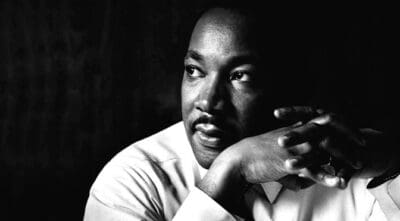
JFF Remembers Martin Luther King Jr.
January 21, 2019
At a Glance
Our staff reflect on the civil rights leader and share their thoughts on how his life and legacy shapes their work with JFF.
Heartfelt and powerful. Those are the responses we received when we asked our colleagues to share their personal reflections on the Rev. Martin Luther King Jr. They include memories of the day Dr. King was shot, calls to reclaim black pride, and stirring reminders that the struggle for racial equality continues, more than 50 years after King’s death. Read on.
The Struggle Is About the Long Game
When I think of Dr. King, I reflect on the quote by the theologian Theodore Parker, whom he often cited: “The arc of the moral universe is long, but it bends towards justice.” In the midst of the struggle, Dr. King believed that justice was inevitable. He believed that oppression was not invincible.
When President Trump courts and cultivates white supremacy in rhetoric and policy. Justice is inevitable. In 2018, the nation elects a House of Representatives with a record number of women of color. Oppression is not invincible.
Dr. King was willing to fight and die for justice that he didn’t know if he’d experience. Civil rights leader James Forman Sr. described his lifelong activism as a fight for justice “for 10,000 years from tomorrow.”
The struggle is about the long game. Resistance rises to the level of the challenge. It rises on the shoulders of giants who attacked inequality in every form. I can rise, too.
—Lucretia Murphy, senior director
A Routine Trip to the Dentist, Then Her World Changed
When I was a student in middle school in Washington, DC, I left school early one day to walk to a nearby dentist appointment. When I returned to school, I found that the building was empty and knew something terrible had happened. It was the day that Dr. King was shot. My world changed. The next days were spent at home watching armed trucks roll down the street and hearing the reports of rioting downtown, including where my grandfather had a retail store. The juxtaposition of Dr. King’s voice against the violence that erupted was a powerful lesson. I knew that I wanted to line up for Dr. King’s call for equity and justice, fully recognizing that other voices that speak out of frustration, outrage, and need must be heard. I believe our JFF work continues to acknowledge this tension and our challenge to hear all voices and find solutions for all.
—Kathy Mannes, vice president
Her Mother’s Call to Action Became Hers
I was a little girl during the Civil Rights Movement and don’t remember details as much as the feeling that pervaded our house—a sense of urgency that demanded our engagement. I remember animated conversations about school desegregation, and the heavy sadness and hushed voices the day MLK was killed. I have fond memories of the weeks I spent in a bible school exchange program organized by my mother, between our suburban white church and a black church in neighboring North Minneapolis. As I grew older, I remember our dining room table covered with campaign literature; my mother had thrown her activist energies into managing the campaigns of local Democrats. She said she would have joined protest marches but she was the mother of three young children in a blue-collar suburb, didn’t drive, didn’t know other activists—it wasn’t her world. Still, the ways she turned her beliefs into action in our home and community had an impact far greater than she knew. Her example continues to drive my work and community commitments.
—Jennifer Freeman, director
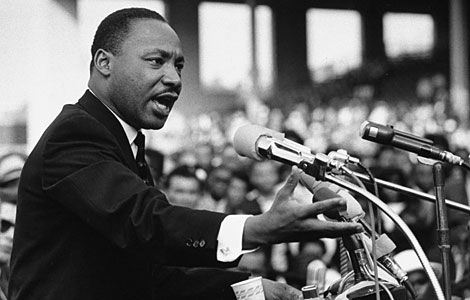
Reclaiming My Black Pride
It was surprisingly hard to think of how Dr. King’s impacted my life. As a person of color, his influence is like breathing—it’s instinctual to the point that you forget about it.
But, thinking back to my childhood, I realize that MLK gave me something I’ve lost over the years: pride in my blackness. I remember going to an MLK Day celebration where the crowd joined together for “Lift Every Voice and Sing.” Maybe it’s just because I’m a choir brat, but that memory resonates. It reminds me that there was a time when shouting my heritage from the rooftops felt good.
This is something I want to find again. There are so many things that I am proud to be—a writer, a wife, a forever-fan of the rock band My Chemical Romance. Now, it’s time to reclaim my black pride.
—Nicole Lewis, copy editor
The Courage to Do What Makes Us Uncomfortable
As I think about Martin Luther King Day, scenes from the movie Selma flash through my memory. In one, Dr. King meets with the Student Nonviolent Coordinating Committee. They very clearly disagree with each other. In another, King meets with President Johnson. Again, there is vivid dissent.
Part of what made King powerful was that he was willing to make people uncomfortable and experience discomfort himself. King—with individuals like Malcolm X acting as strategic foils—deftly bridged power structures and people.
Nonviolence doesn’t mean that we only sit with people who think like us. Nonviolence means that we sit with, listen to, and “win the ‘friendship and understanding’ of the opponent, not humiliate him.”
Today’s deep societal schisms require nothing less than each of us reaching out in friendship and understanding, even when that makes us uncomfortable.
—Elizabeth McWhorter, senior director
What I Strive to Do Daily
I deeply respect Dr. King’s insistence on leveraging every moment of power and privilege to advocate for racial justice and to help others understand the systemic barriers to opportunity that may exist around them. His efforts to disseminate knowledge and compassion cumulated into something I strive to do daily: to help people empower themselves and become advocates for opportunity and access—for their families, their communities, and any others searching for a limitless, prosperous future.
—Jacqueline Gonzalez, senior program manager
What Will You Do?
Hindsight is 20-20—to me, nothing rings more true. In 2019, it’s easy to look back on a Civil Rights Movement from half a century ago and say, particularly when speaking from a place of privilege, “I would have been right there with them.” However, when MLK Jr. was mobilizing a wave of nonviolent activism, his principles were pioneering—on a leading edge that was literally dangerous.
It’s much more difficult to look at where we stand today on civil rights and transforming the systems that will help the U.S. achieve those rights for all: education and workforce development. How far are we willing to go outside of our comfort zones to adopt new policies and programs in our schools and communities, voting in new voices, opening job access to people with criminal backgrounds? Look to the future—can you get as clear a view of it as the one you have of the past?
—Sophie Besl, senior program manager
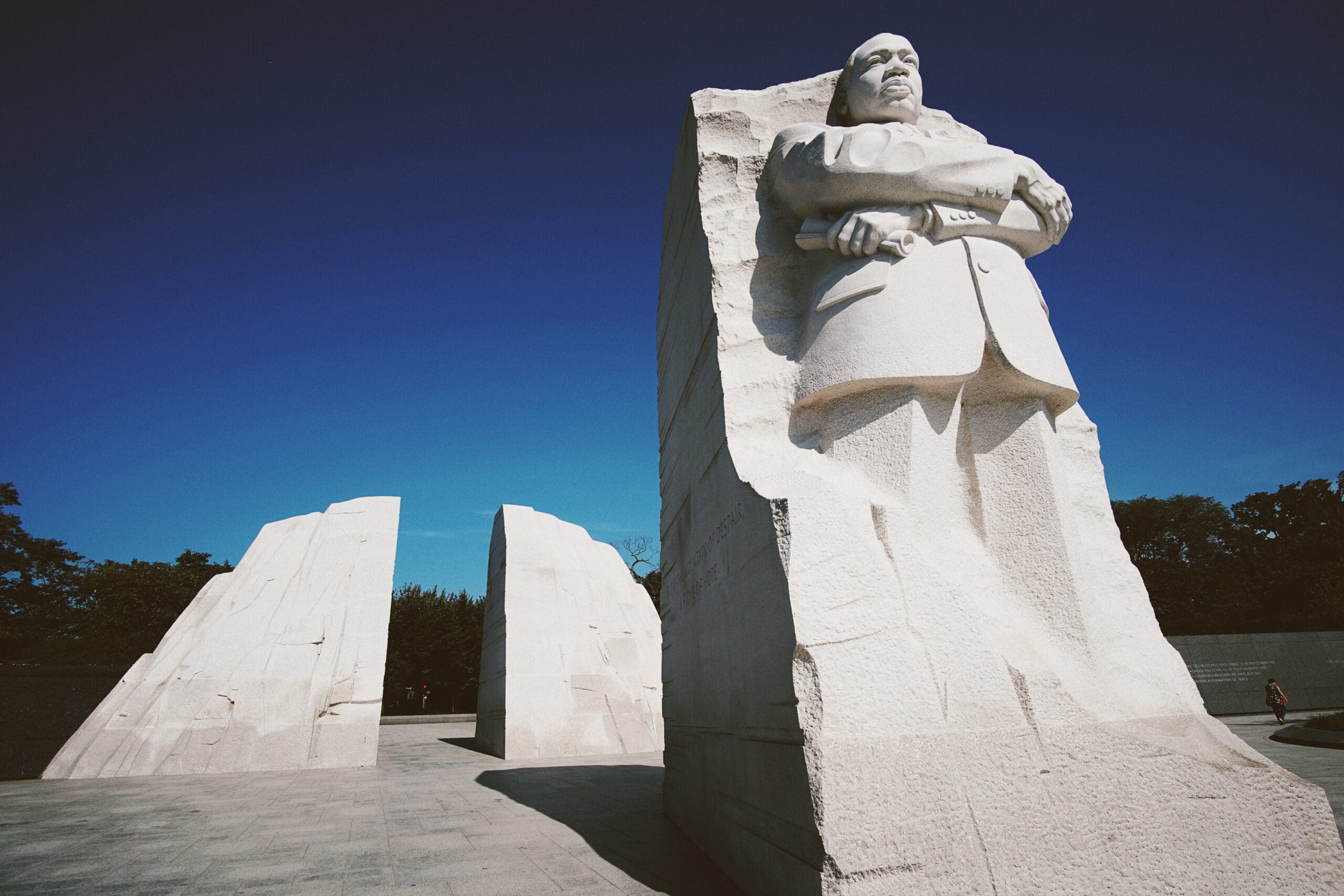
Breaking Free
The first time I saw the Martin Luther King, Jr. Memorial in person, I was awestruck. I’d seen images of the front of the memorial—the reproduction of the physical presence of King. I thought this was the whole memorial in downtown DC. In person, the reality of the memorial was so much more. The image of King breaking free from a slab of rock and moving ahead was profound. The space was powerful. In its entirety, the memorial communicated the essence of the Civil Rights Movement. It transcended King, the man. For me, King’s legacy as the leader of a movement where people struggled to break free is what resonates most. That struggle is ongoing and difficult. So what I celebrate on MLK, Jr. Day is the continued fight for freedom and justice for all and for seeing that struggle in its entirety.
—Felicia Sullivan, associate research director
A Call to Action
In November 2015, I stood with 19 young professional leaders from across Egypt and the United States as we listened to Bernice King, daughter of Dr. Martin Luther King, Jr. call us to action. Her father’s work was unfinished, she said, and it was not his memory that should live on, but his action. During that gathering, located just minutes from the King’s home in Atlanta, Dr. King was transformed from the inspirational advocate I learned about in the classroom to a father, a man whose fight for systems of economic and racial justice were connected to ensuring opportunity for each individual. What struck me after hearing Dr. King’s daughter speak was not that she had to learn to live without her father after his assassination, but that her father’s legacy was one of ordinary individuals speaking out, connecting across geography, backgrounds, and beliefs, to build systems rooted in justice.
—Leah Moschella, senior program manager
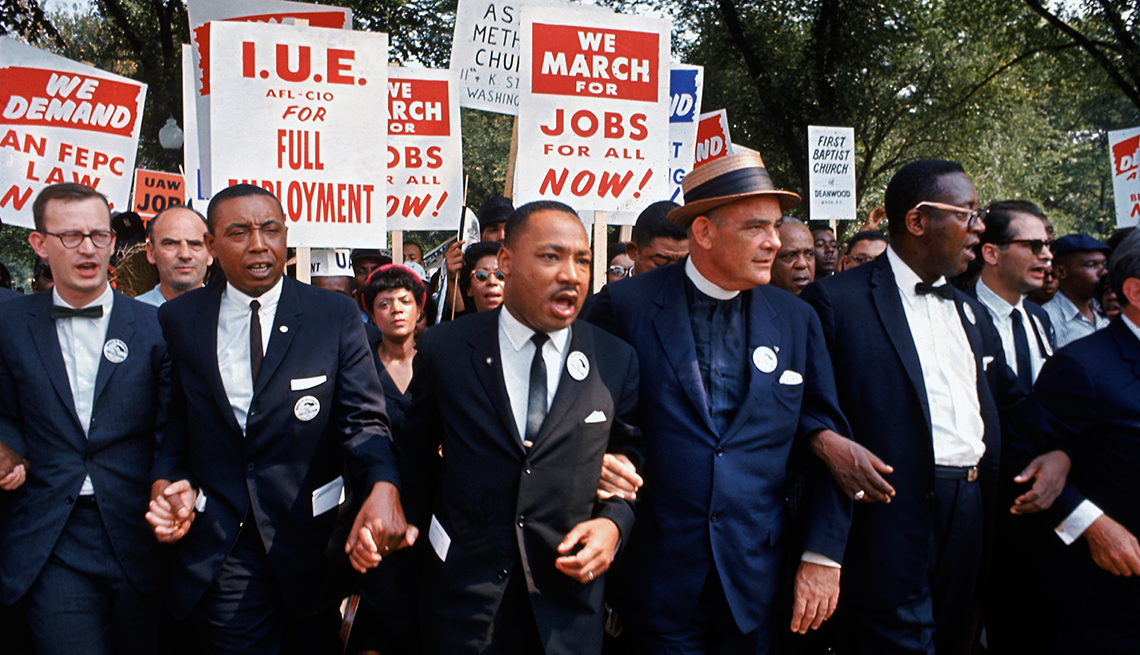
The Future for My Son
I’ve been thinking a lot about Martin Luther King, Jr.’s legacy, mostly because my son was born this past August. Right now, we are focused on the basics of caring for an infant, but during my many sleepless nights I think about the world that he will grow up in. As white parents of a black boy, we feel an even greater urgency to realize King’s vision.
As my son grows up, we will inevitably have conversations about how sometimes life isn’t fair—that’s part of being a parent. But I worry about the conversations about injustice, which I see far too much of these days. I could attempt to shield my son from injustice, but I want him to grow up in an America where he can clearly see us working toward genuine equality.
So I’ve been spending a lot of time holding my son and trying to figure out what my role can be in building a more equitable society—as a parent, an ally, and a citizen.
—Rachel Pleasants McDonnell, associate director
Weusi Shule: A Legacy Passed On
When I was young, I attended Weusi Shule, meaning “Black School,” in Swahili. Set in a vibrant community in the Flatbush section of Brooklyn, it was a significant layer of my foundation, rooted in “Nguzu Saba,” the seven principles—Unity, Self-Determination, Collective Work and Responsibility, Cooperative Economics, Purpose, Creativity, and Faith—each of which played an essential role in the Civil Rights Movement. The principles were apparent in our cultural education, our performing arts, and how we identified ourselves in and around our community.
Dr. King’s dream became my life in many ways. His example was ever present in my life. His story, and those of other black leaders, gave me the courage to stand in picket lines with my mother and sisters. Though we were always engrossed in the energy and rhythm of the cause, we understood mostly that our presence was a necessary part of the call for equity.
—Nia Yisrael, program manager
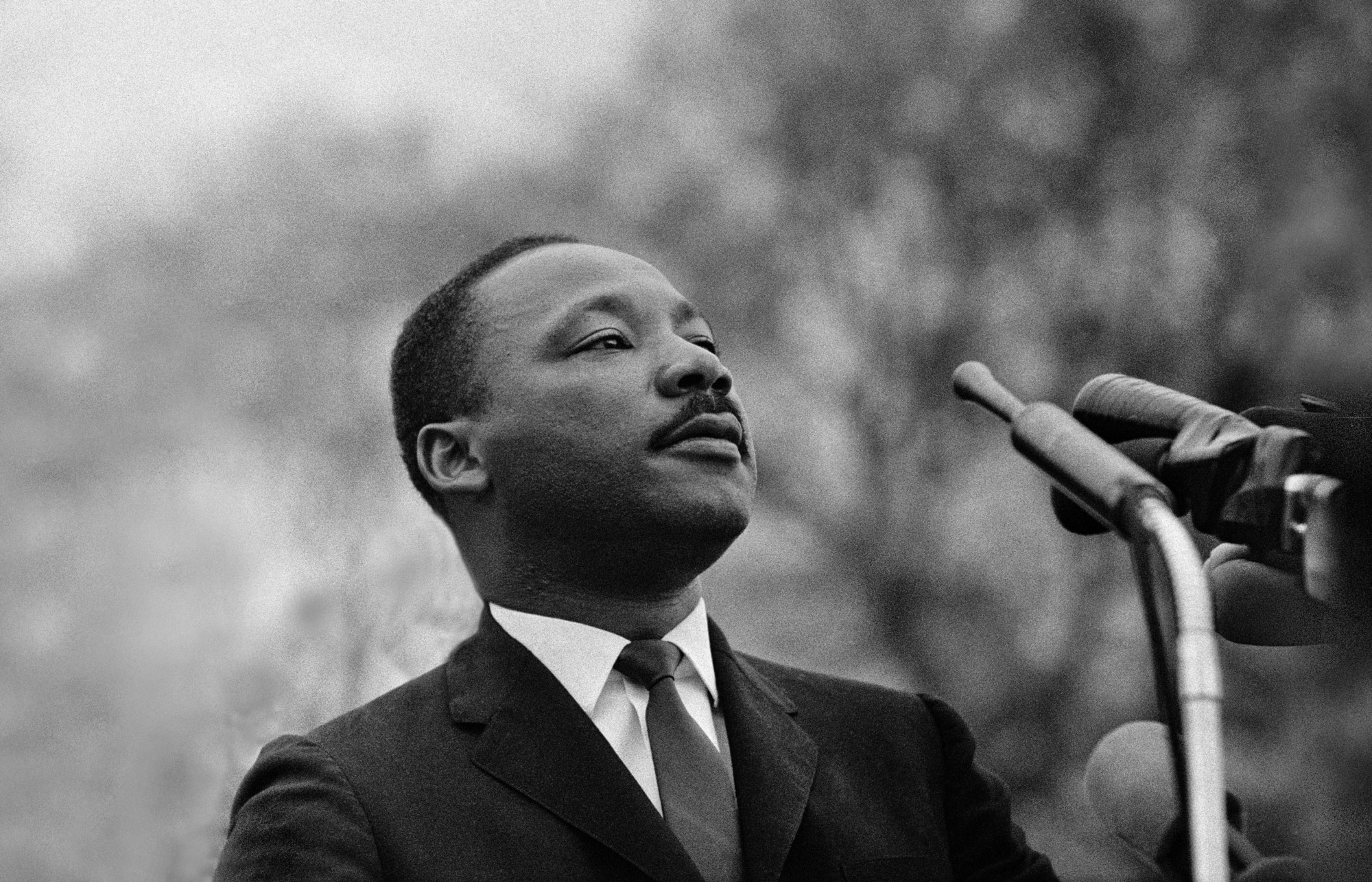
Advocate for the Disenfranchised
I didn’t grow up in the United States, but if I try to recall the most inspirational Americans that permeated the conversations around justice in my small island nation, Jamaica, it would definitely include Martin Luther King Jr. Now, as a U.S. citizen, his legacy continues to inspire me and my actions. I continue to speak up about racial injustice. Dr. King inspired my feelings and conviction for collective action and community power. If I were to zero in on one of his most powerful contributions, it’d be that he emboldened black people to be more confident, not only about self-advocacy, but advocacy for all disenfranchised people, and to never be satisfied with mistreatment or inequality—even when it feels slightly more favorable than the past.
—Keesa McKoy, senior communications manager